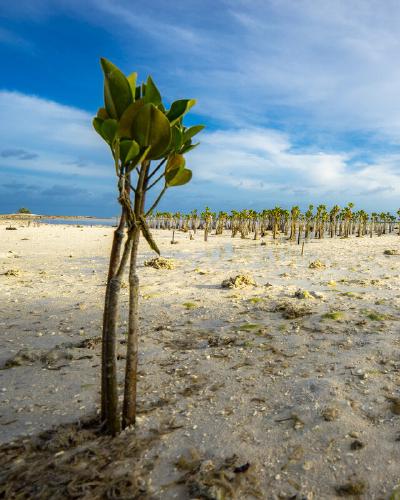After a successful recent reform program, Kiribati is now well equipped with new policies and regulations to foster sustainable and inclusive growth. The reform program was developed through collaboration among ADB, Australia, New Zealand, the European Union, and the World Bank.
vision of growth
As a remote island with limited natural resources, Kiribati faces unique development challenges. The atoll is highly vulnerable to external shocks, disasters caused by natural hazards such as tropical cyclones and drought, and the adverse effects of climate change.
The public sector dominates the Kiribati economy, with state-owned enterprises delivering public services in the water, energy, and transport sectors. Fishing is a major source of livelihood in the atoll and contributes significantly to the country’s gross domestic product (GDP), alongside revenues from its sovereign wealth fund, the Revenue Equalization Reserve Fund.
Despite these challenges, the Kiribati economy showed strong post-pandemic recovery, recording a 4.2% GDP growth rate in 2023—one of the highest among Pacific nations. Though inflation remained high at 9.3%, the estimates for 2024 and forecasts for 2025 are at 3.0% and 2.5%. Meanwhile, infrastructure projects cofinanced by ADB and its partners in water supply, renewable energy, and ocean transport derailed by the pandemic are back on track.
“ADB, along with various development partners, supports Kiribati’s reform efforts to drive faster growth and achieve macroeconomic stability, invest in productivity-enhancing and climate-resilient infrastructure, and improve governance.”

collaboration for reforms
To sustain growth, Kiribati must address weaknesses in public financial management, foster private sector development, and enhance environmental protection.
In response, ADB and its partners developed a reform program to help Kiribati achieve sustainable and inclusive growth. Backed by a $5 million grant from ADB’s Asian Development Fund, which provides grants to ADB’s poorest and most vulnerable developing member countries, the reform’s first subprogram aimed to introduce new policies and legal and regulatory frameworks in three areas:
Public financial management and fiscal sustainability. Kiribati needs stronger public financial management to better fund public services and reduce macroeconomic risks. Upgrading the government’s financial management information system and providing efficient and timely reports would help government departments and ministries make better financial planning, budgeting, and oversight decisions.
Finance and private sector development. A more vibrant and inclusive private sector, so crucial to the country’s economic growth, relies on a finance sector able to reduce financial risks, manage banking operations, and increase access to development financing. However, banking laws and regulatory frameworks are lacking. Policies promoting gender equality and safe workspaces are also needed to increase women’s participation in the workforce.
Protection of the environment and natural resources. The Kiribati economy relies heavily on the atoll’s marine and natural resources, which are increasingly threatened by climate change. Plastic waste pollution is a growing concern, exacerbated by limited landfill space. Existing environmental laws for marine resources preservation and waste management need to be updated to better match international agreements.
ADB coordinated the design of the reform program, with parallel grants provided by the governments of Australia and New Zealand, the European Union, and the World Bank.
“ADB, along with various development partners, supports Kiribati’s reform efforts to drive faster growth and achieve macroeconomic stability, invest in productivity-enhancing and climate-resilient infrastructure, and improve governance,” said Ashish Narain, principal public sector economist and project officer.
what new policies may bring
Completed in March 2024, the first subprogram had already delivered results in the three reform areas.
To improve public financial management and transparency, the government approved a new Fiscal Reporting Policy to ensure more timely and standardized financial reports and a new system for classifying financial data, aligned with international standards. A new Income Tax Act is also set to modernize and simplify the tax system.
The new Financial Supervisory Authority of Kiribati Act establishes the much-needed decision-making financial regulatory body, and the Kiribati Financial Institutions Act will guide the licensing system and regulatory mechanisms for financial institutions. These reforms are expected to create a more stable financial environment, reducing barriers to private sector growth. New policies to combat sexual and gender-based violence, made effective in August 2023, aim to create safer workplaces, increase women’s participation in the workforce, and reduce gender-based violence.
The new Environment Act, enacted in 2022, creates systems to manage waste and pollution, prevent environmental damage, and fulfill international environmental commitments, including those related to climate change. To ensure long-term sustainable management of Kiribati’s fisheries, new laws enacted in late 2021 protect the atoll’s biodiversity and conserve marine resources, as well as cover marine protected areas and integrated ocean management.
The second subprogram, which began in 2025, will build on the foundations set by the first subprogram and help implement, deepen, and institutionalize reforms. By improving economic governance, fostering private sector participation, and strengthening environmental protections, the country is laying the groundwork for sustained growth and resilience.
“Kiribati’s policy reforms have strengthened the enabling environment for gender equality and women’s empowerment and supported women’s economic participation. Women’s active role in the atoll’s economy is critical to achieving sustainable and inclusive growth,” said Lily Anne F. Homasi, senior economics officer.
“Kiribati’s policy reforms have strengthened the enabling environment for gender equality and women’s empowerment and supported women’s economic participation. Women’s active role in the atoll’s economy is critical to achieving sustainable and inclusive growth.”



